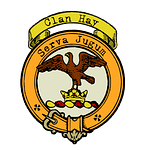Welcome back to "A Clan A Day Podcast," brought to you by bagtownclans.com. I'm your host, Colin MacDonald. Today, we're exploring the rich and complex history of Clan Barclay, a distinguished family whose influence spans Scotland and beyond. Known for their motto Aut agere aut mori—“Either action or death”—the Barclays embody resilience and action, a fitting symbol for a clan that has shaped both Scottish and European history.
The origins of Clan Barclay trace back to the Norman Conquest of 1066. The family's name, originally "de Berkeley," suggests roots in Gloucestershire, England, where they held lands and built Berkeley Castle by 1153. Yet, their presence in Scotland began in earnest during the reign of David I, King of Scots, when a branch migrated north and settled in Aberdeenshire and Fife.
Walter de Berkeley was one of the earliest prominent figures of the clan in Scotland, serving as Chamberlain of Scotland under King William the Lion in the late 12th century. He left a notable legacy, including two daughters who married influential figures like Sir Alexander Seton, establishing alliances that intertwined the Barclays with other powerful Scottish families.
The clan’s main Scottish branches quickly entrenched themselves in Kincardineshire and Fife. The Barclays of Mathers, one such branch, gained significant influence. Humphrey de Berkeley, noted for his generous donations to the Abbey of Arbroath, and his son John, who upheld the family's power through land disputes and charters confirmed by King Alexander II, exemplified the Barclays' early assertiveness.
Fast forward to the 14th century, Sir David Barclay of Cairny-Barclay emerged as a close ally of King Robert the Bruce during the Wars of Scottish Independence. Sir David was captured at the Battle of Methven in 1306 but returned to fight loyally alongside Bruce, securing his legacy. The Barclays’ loyalty was rewarded with lands, including the lordship of Brechin and parts of Glenesk, reflecting their high status in the kingdom.
By the 17th century, the clan’s fortunes expanded through international connections. Colonel David Barclay of Urie was a significant figure during this period. A seasoned soldier, he served under Gustavus Adolphus of Sweden before returning to fight in the English Civil War. His transformation into a Quaker while imprisoned at Edinburgh Castle marked a pivotal turn for the clan. This newfound religious conviction passed to his son, Robert Barclay, whose influence stretched far beyond Scottish borders.
Robert Barclay of Urie, remembered as the "Apologist," wrote the seminal An Apology for the True Christian Divinity in 1675, becoming one of the most prominent Quaker theologians. His works positioned the Barclays as intellectual leaders in religious reform. His son, David Barclay, further diversified the family's legacy by founding Barclays Bank, a name synonymous today with global banking.
Another notable offshoot of the clan left its mark on European history. Field Marshal Prince Michael Andreas Barclay de Tolly, descended from the Barclays of Towie, played a crucial role as the commander of the Russian army during Napoleon's 1812 invasion. His strategic withdrawal and scorched-earth tactics earned him enduring fame. Despite initial skepticism from the Russian nobility, Barclay de Tolly’s military acumen was vindicated when Napoleon's Grand Army was decisively defeated. His portrait still hangs in the Hermitage Museum, cementing his place as a hero of the Russian Empire.
Clan Barclay's architectural legacy is equally impressive. Towie Barclay Castle in Aberdeenshire, constructed in the 12th century, was a stronghold that symbolized the clan's enduring power. Balvaird Castle was another seat linked to the Barclays, showcasing their architectural and regional influence.
Yet, like many clans, the Barclays have seen the rise and fall of their fortunes. The Barclays of Mathers, for instance, lost their ancestral lands in the 17th century after nearly 500 years of continuous possession, due to financial mismanagement and courtly expenses. Despite such setbacks, the family's influence did not wane.
Today, the clan remains active, though it is currently without a chief following the recent passing of Peter Charles Barclay of Towie Barclay in 2023. The Clan Barclay Society continues to preserve the history and traditions of this storied lineage, celebrating their heritage at events and gatherings.
From warriors and statesmen to religious reformers and European generals, the history of Clan Barclay is a tapestry of loyalty, adaptability, and ambition. Their story speaks to the enduring spirit of Scotland’s clans and their indelible mark on the world stage.
Thank you for joining us for today’s exploration of Clan Barclay’s rich heritage. Be sure to tune in tomorrow for another captivating episode of "A Clan A Day Podcast." I'm Colin MacDonald, and as always, Go n-éirí an bóthar leat.













Share this post